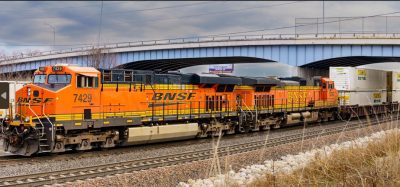OFF THE RAILS: Global Ukraine Rail Task Force and ALLRAIL’s Nick Brooks
Posted: 22 February 2024 | Emily Budgen | No comments yet
This week’s interviewee on Global Railway Review’s ‘Off the Rails’ is Nick Brooks, Co-Chair of the Global Ukraine Rail Task Force.


In the new Q and A series, ‘Off the Rails’, with figures from the rail industry, I spoke to Co-Chair of the Global Ukraine Rail Task Force, Nick Brooks, who also works for ALLRAIL, regarding the current situation in Ukraine, why rail is important to the Ukrainian war efforts and what would reconstruction entail for the country post-war. Read below to find out more about the organisation and how Nick and his colleagues are helping the Ukrainian war effort.
How soon after the Russian invasion of Ukraine was the Global Ukraine Rail Task Force formed?
Within two weeks. We were inspired by an independent passenger rail operator called RegioJet that started free dedicated evacuation trains for refugees to the EU just one week after the invasion. Compared to that, setting up a working group was arguably much easier, but we still had to find each other, and many of the Europeans and Americans involved (it’s a global group) had not even met before.
We’re two years into Russia’s aggression, how has the Global Ukraine Rail Task Force helped those employed in the rail industry?
The most obvious way is our donation campaign in which more than 300,000 US Dollars were collected. The proceeds were sent to the Trade Union of Railwaymen and Transport Construction of JSC Ukrainian Railway to be used to purchase well over 13,000 food packages and 18,000 bottles of drinking water that were shipped and delivered to railway workers and their families at the frontline and newly liberated territories of Ukraine (Kharkiv, Kupyansk, Kherson, Nikopol, Marhanets, Izyum, Konotop, Bakhmach, Khutir-Mikhailivsky, Chernihiv, etc.). The food packages include flour, pasta, rice, corn and wheat grits, oil, canned fish and meat, pate, tea, sugar, and biscuits. It was the only international donation campaign, with the backing of a global charity, that was dedicated to victims in the Ukrainian rail sector.
Your board serves in ‘individual capacities’. How does this structure affect your organisation’s strategy?
Everyone serves on a pro bono We all have other day jobs. In my case, I also manage ALLRAIL, the European non-profit for independent passenger rail companies. It is unfortunately not full time, not by a long shot. Therefore, there is no capacity to get involved in detailed, customised work, and instead we aim for results that can be achieved by using our task force’s member’s expertise and political connections in a fast and effective manner.
Why is it important that Ukraine has new rail links into EU countries?
In the past, for well-known historical reasons, the Ukrainian rail system has been very much orientated towards the Russian sphere of influence. The most obvious example being the same broad-gauge rails as in Russia, which are wider than the European standard gauge. But it does not stop at this. Just a few weeks ago on our Task Force’s latest trip to Kyiv, I learned that – like in some other countries around the world- rail kilometre distances on the network were measured, until now, in terms of how far they are from the capital city. But that capital was Moscow, not Kyiv!
Now, the Ukrainian government is considering banning all transport links to Russia for the next 50 years, and for Ukraine to enter the EU. New rail links into EU countries are a crucial part of Ukraine’s change of orientation away from Russia towards becoming an EU Member State.
How can the Global Ukraine Rail Task Force maximise its passenger rail capacity?
Right now in 2024, it is Ukrainian Railways under supervision of its government and its international allies that have the task of maximising passenger rail capacity. The Task Force was primarily involved in dedicated refugee evacuation trains back in the initial months after the invasion, but those special services ceased around May 2022.
That being said, we do support Ukraine entering the EU and, consequently, the Ukrainian rail system becoming a full part of the Single European Rail Area (SERA). This in itself will help maximise passenger rail capacity in the country. For example, in my day job as Secretary General of ALLRAIL, I can see and take actively part in the EU institutions’ hard work on improved rail capacity management initiatives that will improve efficiency and connectivity, for example by building a new Trans-European Transport Network (TEN-T). Ukraine will be a full part of this.
Why are the continued operations of rail freight important to the industry?
This is mainly due to wheat and other Ukrainian produce, such as barley and grain in general. Ukraine is known as the “breadbasket of Europe” but ultimately its agricultural crops help feed other many parts of the world too, such as Africa. A thriving outflow of goods is crucial to the economic success of Ukraine. Yet with Black Sea ports largely blocked by Russia, much more has had to be transported out of the country by rail than before Russia’s invasion. Therefore, rail freight has taken on an enhanced role since the war began, particularly with international exports. At the same time, Ukraine is also reliant on the import of other things; it is not a self-sufficient country, and with the closure of airspace too then rail freight also plays an important role in the inflow of goods, as well as transporting freight around the country.
The Global Ukraine Rail Task Force has started thinking ahead for Ukraine’s reconstruction. Why is it important that this is considered while the conflict is still ongoing?
As mentioned before, the Task Force welcomes Ukraine’s application to enter the EU, presumably at an expedited date after the war ends (although nothing is certain yet).
Right now – and independently of Russia’s invasion – the EU actively engaging improved rail capacity management initiatives that will improve efficiency and connectivity, for example by building a new Trans-European Transport Network (TEN-T). It is important that Ukraine is included in these plans from the beginning – in 2024 – which is why we are thinking ahead in this area already.
How does your organisation help those in the rail community, who may not be employed by the sector?
My first thought here is the rail passengers in Ukraine. A few weeks ago in Kyiv, during the 2nd Global Ukraine Rail Task Force delegation to Kyiv (the 1st one was in April 2023), we met finance and social policy teams of Ukrainian Railways in order to discuss longer-term plans.
The ‘Iron Shift’ programme as they call it aims to provide rehabilitation for wounded rail workers, support for the children of staff who haven’t come through the war, and to make the railway accessible, not least for the steady stream of veterans returning from the front with life changing injuries. Knowledge transfer is required from other countries that have enabled better accessibility of their passenger rail systems over the past decades, even if primarily for disabled people and not war veterans. One excellent example being the United Kingdom. The scale of this task is considerable, and the Task Force hopes to provide our Ukrainian colleagues with ongoing assistance to rise to it.
Readers wishing to make a donation to the Task Force, can go to this link: Global Ukraine Rail Task Force – WE AID (we-aid.org)
More Like This
OFF THE RAILS: ProRail’s Martijn van Noort
Rail Infrastructure Asset Management Summit (RIAMS) 2024
Which? report on ticketing unveils higher cost for offline passengers
Related topics
Cargo, Freight & Heavy-Haul, European Rail Traffic Management System (ERTMS), European Train Control System (ETCS), Funding & Finance
Related organisations
ALLRAIL, European Union (EU), Global Ukraine Rail Task Force (GURFT), RegioJet








